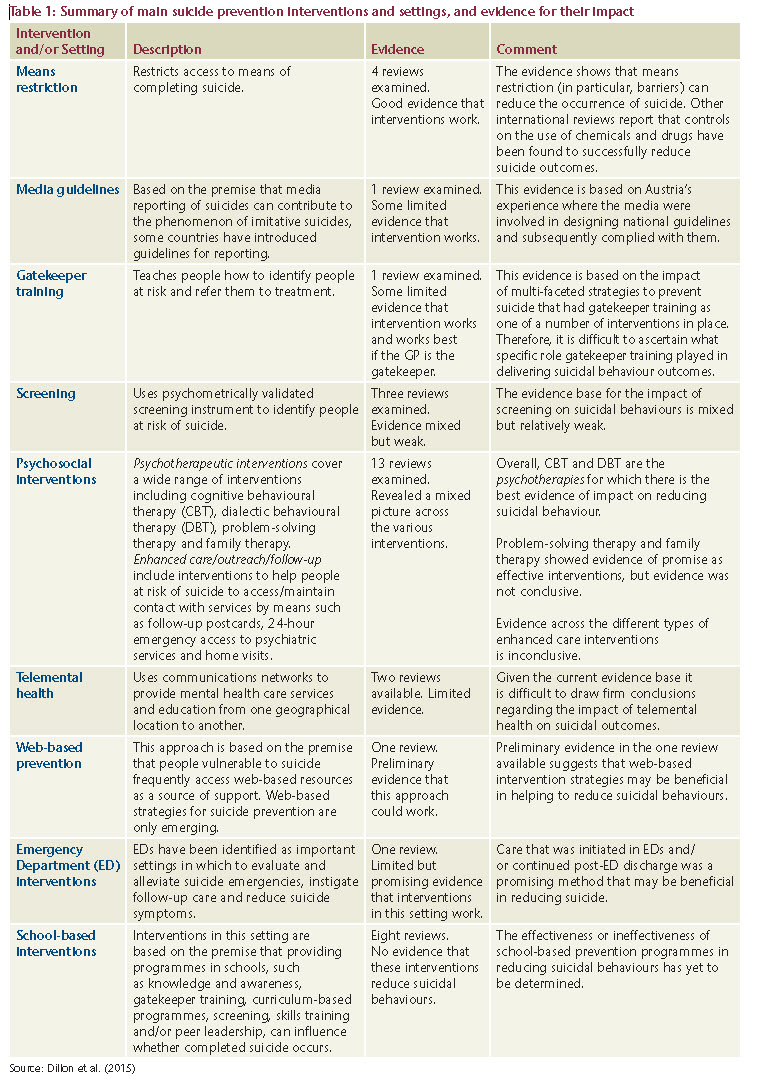Long, Jean (2015) Ireland’s national suicide strategy 2015–2020, and the evidence base. Drugnet Ireland, Issue 55, Autumn 2015, pp. 4-5.
| Preview | Title | Contact |
|---|---|---|
|
PDF (Drugnet Ireland 55)
3MB |
On 18 June 2015 the Taoiseach, Enda Kenny TD, launched Ireland’s national suicide strategy Connecting for life.1 The strategy envisions an Ireland where fewer lives are lost through suicide, and where communities and individuals are empowered to improve their mental health and wellbeing. This vision will be achieved through seven goals:
- Better understanding of suicidal behaviour
- Supporting communities to prevent and respond to suicidal behaviour
- Targeted approaches for those vulnerable to suicide including alcohol and drug users
- Improved access, consistency and integration of services
- Safe and high-quality services
- Reduced access to means
- Better data and research
The outcomes expected by 2020 are a reduced suicide rate in the population and among specified priority population groups, and a reduced rate of presentations of self-harm in the whole population and among specified priority groups. The strategy will be implemented by a National Cross-Sectoral Steering and Implementation Group.
The most common disorders associated with suicidal behaviour are depression and alcohol and other substance use disorders which are found in 25–50% of all suicides. People with alcohol and drug problems are one of the specified priority population groups. The HSE will continue to roll out programmes aimed at early intervention and prevention of alcohol and drug misuse. Their campaigns will build a link between alcohol and/or drug misuse and suicidal behaviour in all communications.
Evidence for effectiveness of suicide prevention interventions
On the same day as Connecting for life was launched, the Health Research Board (HRB) published its evidence review of the effectiveness of suicide prevention interventions.2 The HRB was commissioned by the National Office of Suicide Prevention (NOSP) to examine the international evidence base for suicide prevention in order to establish which interventions were successful in reducing suicidal behaviour including suicide ideation, self-harm, suicide attempts or death by suicide.
The HRB used 34 published reviews, some of which covered more than one intervention. The HRB review assessed five interventions (means restriction, media guidelines, gatekeeper training, screening and psychosocial interventions) and four settings (telemental health, web-based interventions, emergency departments (EDs), schools and youth strategies).
Overall, the review found the body of evidence on suicide prevention interventions to be limited but some important interventions reduced suicidal behaviours. These are restricting access to means of suicide, cognitive behavioural therapy* and dialectic behavioural therapy.** Suicide prevention interventions in ED settings (for example, reviews of treatment and expectations) also show promise. Telemental health and web-based interventions have only emerged recently and there is not enough evidence to comment on their success. Table 1 summarises the findings.
The authors recommend that all these interventions should continue to be studied so that stronger evidence-based conclusions can be reached. Published evidence in relation to suicide prevention interventions is limited. This does not mean that interventions are ineffective, but rather that there is little evidence published in peer-review journals. In addition, the societal context is important and there is a need for further high-quality research that takes account of the Irish context.
The HRB welcomes the strategic approach adopted in Connecting for life and in particular its focus on monitoring and evaluation.
* Cognitive behavioural therapy (CBT) is an action-oriented form of psychosocial therapy that focuses on changing an individual's thoughts (cognitive patterns) in order to change his or her behaviour and emotional state.
** Dialectic behavioural therapy (DBT) is a type of cognitive behavioural therapy. Its main goal is to teach a person skills to cope with stress, regulate emotions and improve relationships with others.
- Department of Health, Health Service Executive and National Office for Suicide Prevention (2015) Connecting for Life: Ireland’s National Strategy to Reduce Suicide 2015-2020. Dublin: Department of Health https://www.drugsandalcohol.ie/24167/
- Dillon L, Guiney C, Farragher L, McCarthy A and Long J (2015) Suicide prevention: an evidence review 2015. Dublin: Health Research Board. https://www.drugsandalcohol.ie/24168/

J Health care, prevention, harm reduction and treatment > Health services, substance use research
J Health care, prevention, harm reduction and treatment > Type of care > Mental health care (Psychiatry / Psychology)
VA Geographic area > Europe > Ireland
Repository Staff Only: item control page